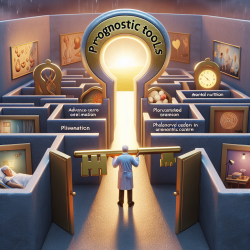Introduction
The field of speech-language pathology is continuously evolving, with data-driven approaches becoming increasingly vital. This is especially true when it comes to improving outcomes for children and adults alike. A recent study titled "Study protocol for the development and validation of a clinical prediction tool to estimate the risk of 1-year mortality among hospitalized patients with dementia" provides a significant leap in understanding how prognostic tools can be used to enhance patient care. This blog will delve into how practitioners can utilize these insights to improve their skills and patient outcomes.
The Importance of Prognostic Tools
Prognostic tools are essential in healthcare as they provide a systematic approach to predicting patient outcomes. For patients with dementia, these tools can be particularly beneficial. The study highlights the need for a robust prediction model that can estimate the risk of 1-year mortality among hospitalized dementia patients. Such a tool can serve as a critical prompt for healthcare providers to initiate advance care planning, ensuring that care is aligned with patient goals.
Implementing the Study's Findings
Practitioners can enhance their practice by integrating the study's findings into their care strategies. Here are some actionable steps:
- Advance Care Planning: Use the prognostic tool as a trigger to start discussions about advance care planning with patients and their caregivers. This ensures that care decisions are made in alignment with the patient's wishes.
- Access to Palliative Care: The tool can also help identify patients who may benefit from specialist palliative care services, thereby improving the quality of life for patients with complex needs.
- Continuous Learning: Encourage further research and training in the use of prognostic tools. Understanding the nuances of these tools can significantly enhance decision-making and patient outcomes.
Encouraging Further Research
While the study provides a strong foundation, it also opens the door for further research. Practitioners are encouraged to explore the following areas:
- External Validation: Before widespread implementation, the tool requires external validation to ensure its effectiveness across different populations and settings.
- Impact Studies: Investigate the potential impact of the tool on clinical decision-making and patient outcomes. This will help refine the tool and its applications.
- Integration into Practice: Research how best to integrate the tool into existing electronic medical records systems to streamline its use in clinical settings.
Conclusion
Incorporating data-driven tools like the one discussed in this study can significantly enhance the care provided to patients with dementia. By utilizing these tools, practitioners can ensure that care is not only effective but also aligned with the patient's goals and needs. As we continue to embrace technology and data in healthcare, the potential for improved patient outcomes grows exponentially.
To read the original research paper, please follow this link: Study protocol for the development and validation of a clinical prediction tool to estimate the risk of 1-year mortality among hospitalized patients with dementia.










